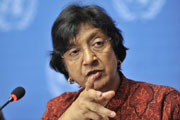The United Nations human rights chief today urged Ugandan authorities to immediate halt the use of “excessive” force against opposition politicians and protesters, saying it was only fuelling the crisis in the African nation, where at least eight people have been killed and hundreds of others injured in recent weeks.
UN High Commissioner for Human Rights Navi Pillay issued a statement in which she described the use of force as disproportionate and said they were impinging on the key freedoms of ordinary Ugandans.
Ms. Pillay drew attention to the case of Kizza Besigye, the opposition leader who has been arrested four times in the past three weeks, shot in the hand on one occasion and reportedly not fully recovered his sight after being hit by pepper spray at point-blank range on Thursday in Kampala, the capital.
“The manner of Dr. Besigye’s arrest on Thursday was shocking,” she said. “The excessive use of force by security officers was plain to see in the television footage of the event. While I do not condone the violent rioting that followed, the Ugandan authorities must realize that their own actions have been the major factor in turning what were originally peaceful protests about escalating food and fuel prices into a national crisis.”
Uganda’s police force and the People’s Defence Force have indiscriminately used live bullets, rubber bullets, tear gas and pepper spray against demonstrators since the so-called ‘Walk to Work’ protests began on 11 April, and even sometimes against individuals not involved in the protests, according to information compiled by Ms. Pillay’s office.
Tear gas has also been fired into schools, health-care centres and homes, the Uganda Human Rights Commission reported.
“Many of these actions clearly constitute disproportionate and excessive use of force. Eight people have now lost their lives, including a two-year-old girl allegedly shot by a member of the security forces.”
More than 250 others, including many children and pregnant women, have been hospitalized because of tear gas inhalation or injuries caused by live ammunition, rubber bullets or severe beatings. Another 580 have been arrested across the country.
“The intervention of the security forces has resulted in infringements of the rights to life, liberty and security of the person, as well as of the freedoms of association, assembly and expression,” Ms. Pillay noted. “In addition, the manner and motivation of the arrests and criminal charges against Dr. Besigye and other opposition leaders raise particular concerns.”
The High Commissioner welcomed the stated intention of the Ugandan Government to begin dialogue with opposition leaders and said it should address “the legitimate concerns and demands of the population” about rising costs of living and broadening the political space.
The Government has offered compensation to some of the victims or their relatives and Ms. Pillay stressed that the compensation must be proportionate to the damage suffered.
Further protests are planned to take place on Monday, and Ms. Pillay urged authorities to “refrain from any further disproportionate use of force and to ensure respect for the people’s rights to freedom of assembly and expression in accordance with Uganda’s 1995 Constitution and its international obligations.”
She also called on the Government to conduct thorough, prompt and impartial investigations into the human rights violations carried out by the country’s security forces.
UN News Service

